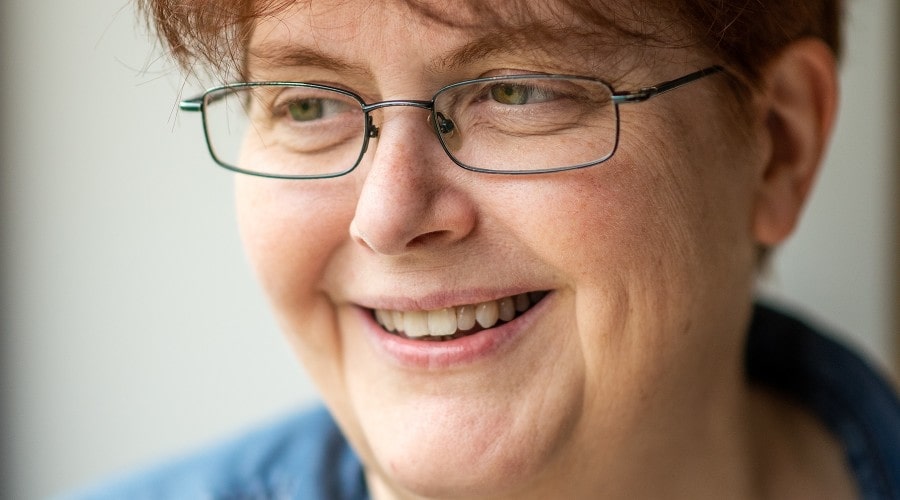Chris chats to top TV dramatist Sally Wainwright about starting out, 2 am starts and her new book deal, and shares her tips for getting your first TV commission (from 2014).
Read more: Sally Wainwright’s writing processBAFTA-winning UK writer, producer and director Sally Wainwright is best known for creating memorable characters and penning some of the UK’s most popular TV dramas like Happy Valley, Last Tango in Halifax and Scott and Bailey.
With a writing career spanning over 25 years, Sally first cut her teeth as a jobbing writer on long running BBC Radio 4 soap, The Archers.
“To start with, I remember being totally shocked by the deadlines. I’d only written for myself before that point – now I had to write five episodes in two weeks. So I thought I better start getting up at 5am.” Whilst Sally quickly got used to the constant churn demanded by soap writers – she struggled with the attitudes of some fellow writers.
“There were some writers I worked with – normally middle aged blokes – who used to claim they could do nothing for two weeks then write everything just before the deadline. Whether that was true or not, I don’t think you produce quality writing like that – it’s disrespectful too. Very early on I got into this habit of thinking that I always have to stay ahead – I’m still like that now. I always have to know that I’m at a certain point in the process every day. I always like to surprise people about how quickly I can turn things round – it’s a personal pride thing, that’s my reward.”
Writing routine: an early start
Sally’s daily writing routine starts very early – some would say in the middle of the night – as she likes to get cracking around 2am each morning. With few distractions and a “cosy feeling that everyone else is asleep” she feels starting early is far more productive than sitting at a computer for six hours during the day.
Her writing practice hasn’t always been the same though. A self-proclaimed workaholic, before having children she used to work at all hours of the day but once her sons were born, her work patterns had to change. She had to become more disciplined if she wanted to write and have a family life. Having children also impacted on the number of projects she would work on at any one time.
“My output looks very varied but now, I only ever do one thing at a time. I went through a stage of writing five shows at once – but that just became unmanageable. I remember having a conversation with [fellow writer/producer] Kay Mellor saying that working on so many projects was taking its toll. She said, choose the one you’re most excited by and do that – so that’s what I did.”
Build up your skills: character and dialogue
After The Archers, Sally started working on TV soaps such as the UK’s best-known show, Coronation Street. An experience she says that taught her a lot about how to structure a story:
“The main thing I learned working on Coronation Street was about storytelling. Scripts are made up of three things, character, dialogue and story. Character and dialogue come quickly to me but coming up with stories is a really tough discipline. Story is something you’ve got to spend time bashing out and it’s useful if you’ve got other people to bash stories out with.”
Starting from scratch, structuring a story
Whilst working on soaps with established characters is one thing, creating a series from scratch – as she has done multiple times now – is something completely different. So where do you even start? In writing the hugely successful Happy Valley, Sally says the starting point was Catherine – the lead character.
“Catherine’s character was always pretty well formed for me – but then I had to develop her situation. I tend to start by splurging – sitting down at the computer, opening up Word and bashing out everything that’s in my head – everything I know already about this character. From there, you start inventing her life and everyone in it – that Catherine lives with her sister who’s an ex-drug addict, that her daughter’s dead but she’s got a child and that her dead daughter’s got some connection to one of the henchmen in the drug gang. The story lines start forming.”
I always like to surprise people about how quickly I can turn things round – it’s a personal pride thing, that’s my reward.
Sally Wainwright
Once the main characters and plot lines are drawn out, the structure of the six episodes start to take shape. Whilst Sally and her producers at Red Productions have a general idea of how the story will progress – they might not always have all six episodes pinned down entirely in terms of plot and structure. This is where experience and confidence comes in – says Sally.
“Sometimes when you start you know you’ve got really good stories up until episode four but you haven’t a clue what’s going to happen in five and six. You just have to trust yourself that by the time you get there, you know what will come next – and that’s all about confidence. However, even now, every time I start a script I always think this is ‘the one’ I’ll never be able to write. It’s scary – it all comes out of your head, nothing happens until you write it down.”
A TV writer and director – what next?
Sally was able to direct one episode of Happy Valley – something she finds very rewarding but rarely gets the chance to do due to the time pressure of being a writer. However, being a director has made writing even tougher.
“I’m writing scripts now for the third series of Last Tango that I know I’m not going to direct. It’s really hard to know I’m going to have to hand them over to somebody else to realise,” she said.
As well as a move into directing, she’s also considering other forms of writing besides scriptwriting. In fact, Sally has been handed a contract to write a novel – based on the strength of writing Last Tango in Halifax. However, she says that writing dialogue is – and always has been – her first love.
“I think I’ve always had a compulsion to write dialogue rather than prose or poetry. When I was seven, I started writing down the things people said – it was something I just had to do. I think I was born with it. It’s like being able to draw or paint. I was literally compelled to write down the things people said.”
From script to commission: Sally Wainwright’s 4 tips for budding writers
- Don’t take no for an answer: If you send your work out to people keep sending it until you get responses and have faith. If you know you’ve got that compulsion to write then have faith in it.
- Write a complete piece: Write a piece you’re proud of and think of it as a calling card. You need to be able to show that you can write a completed piece of work rather than write a pitch or a bit of a script. Show you can write something with a beginning a middle and an end.
- Introduce yourself first: If you haven’t got an agent, send an introductory email to a producer asking them whether they’d like to see a script before you send it. See what the response is and send it in.
- Don’t send it until it’s ready: When you do send the script in, don’t send in any apologies or explanations. Don’t start asking for their indulgence because you haven’t quite got the character right yet – get the character right then send it in.




